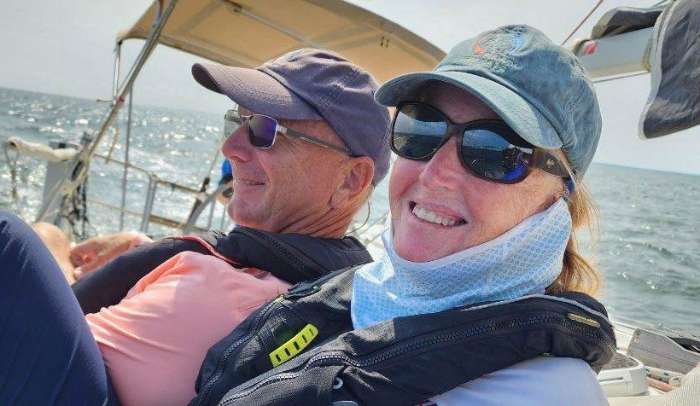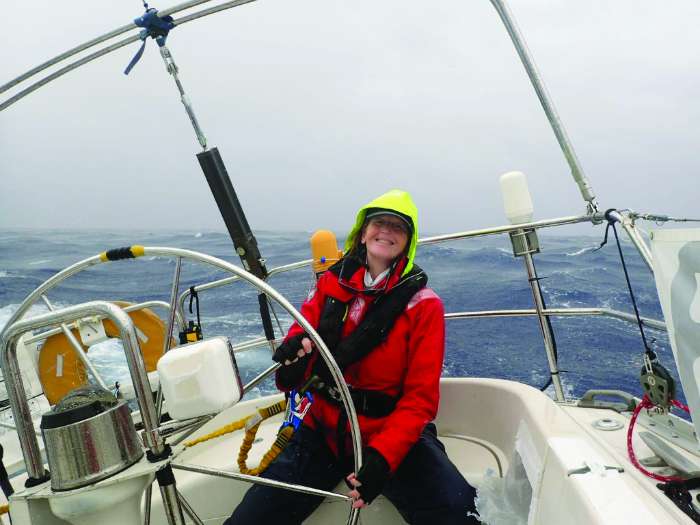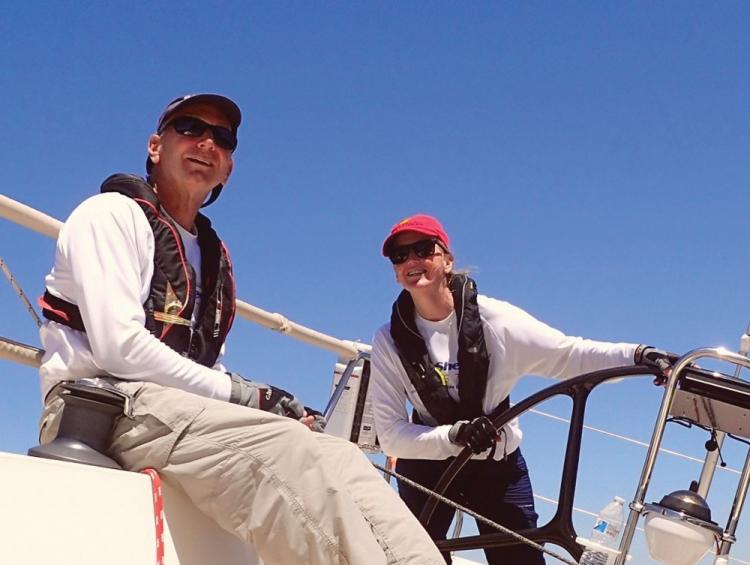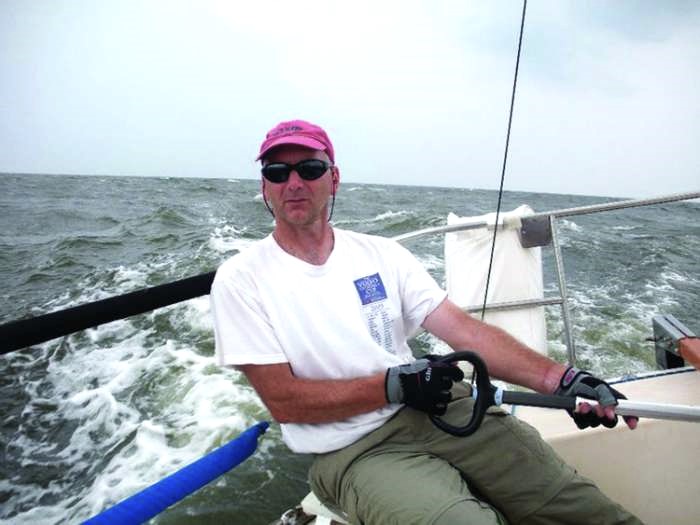A Q&A With an Experienced Bluewater Sailing Couple
One of the benefits of living in the Chesapeake region is that you meet all levels and types of sailors, from weeknight racers to circumnavigators. While we collectively share a passion for sailing, individually we have charted different courses to realize our sailing dreams. It never ceases to amaze me how different those paths can be. And I love that! Each sailor’s story has the potential to be an inspiration to another, often without realizing it.

I recently interviewed a Chesapeake Bay couple who have notably ventured to the Pacific and Indian oceans in addition to sailing the Atlantic. Captain Dave Tabor and his artist wife Carol Vaughn are often hired as a “twofer” since Dave holds a USCG 100-ton Near Coastal license and Carol is an accomplished first mate. Their sea tales reveal two very different paths for both of these veteran ocean passagemakers. Here are their answers to my questions in their words:
Dave, you’ve been sailing since your teenage years. What was your first ocean passage?
In the late 1990s, I connected with an owner who needed crew from Antigua to Bermuda. I had done a couple of coastal deliveries to Block Island and other destinations, so I joined as crew, we had a good passage, and I built a relationship. After that, I helped him with additional deliveries over five years, totaling more than 5000 miles on the same boat. Since then, I’ve sailed 40,000 ocean miles and visited 19 different countries, mostly on other people’s boats.
Carol, I know you learned to sail after meeting Dave in 2006. What was your first ocean passage?
In 2017, Dave did his second Bermuda 1-2 race and talked me into sailing the double-handed leg with him from Bermuda back to Newport on Dianthus, our Canadian Sailcraft Merlin (CS36M).

Carol, how did you prepare for going offshore?
Five years of weekly racing and a few coastal deliveries taught me a lot! Before the 2017 Bermuda 1-2 offshore race, I had crewed weekly with Dave in Rock Creek Association’s (RCSA) Wednesday night races as well as many weekend races on the Chesapeake Bay. I also joined Dave doing six near-shore and coastal deliveries, from 2011-2016. I have personally transited the C&D Canal 14 times on nine different boats. All that sailing with Dave gave me the confidence to join him in the Bermuda 1-2 race.
Dave, why do you love racing?
It’s challenging and exciting. It forces one to choose and learn and to play and experiment. I hate “set it and let it.” I have a hard time not fiddling with the sails. I especially like the challenge of singlehanding, but I also enjoy sailing with buddies, as I did in last year’s Governors Cup.

You both have sailed some distant waters. Tell us a few highlights about sailing in the Pacific and Indian oceans.
In 2018, with only five weeks’ notice, we jumped at the opportunity to sail with New Zealand friends on their Oyster 54. They recommended us as unpaid crew for a boat in the Oyster World Rally. We sailed from New Zealand to Vanuatu, Australia, and through Indonesia. There we changed boats and continued across the Indian Ocean to Cocos, Mauritius, Reunion, Durban, and Cape Town, South Africa. We were gone for ten months. It was a once-in-a-lifetime experience!

What do you enjoy about ocean passages?
We love the solitude of being alone on the water and experiencing wildlife and sunsets. The night sky in the Indian Ocean was unsurpassed, with other constellations melting into the Milky Way. We think that Starlink has ruined the idyllic ocean experience. We recently journeyed from Panama to French Polynesia on a boat that had Starlink. We didn’t enjoy it nearly as much. The temptation to be online was too great, and we didn’t feel as close to nature, nor did we develop closer relationships with other crew.
Ocean passages enable us to visit places by boat that can’t be experienced the same way by other transportation modes, as when we stopped in Cocos (Keeling) Islands in the Indian Ocean. Arriving by boat to a remote village means that we must adjust to the locals and respect their customs. We have to trust and earn their trust. Ocean passages are remembered by the people you meet, whether other sailors or by interacting with natives.
What fears do you have about crossing oceans, if any?
The other crew! [They exclaimed simultaneously.] We fear other people’s fears! It’s why we doublehand a lot. Logistics are easier when it’s just the two of us. Even if we know people beforehand, personalities can be quite different on a boat.
Surprisingly, you didn’t mention weather as a fear.
[They laughed, and exchanged looks] “Well, after Antigua…” Dave was skipper and Carol was crew on a delivery from Deltaville, VA, to Antigua. Weather delayed the departure to the end of November. It was very cold with 30-plus knots and eight- to 10-foot waves for days on end. They eventually had to hove-to for 14 hours to avoid 45-knot winds. Heaving-to meant that they could get rest and avoid worsening weather. Then, they lost their steering, but fortunately the autopilot worked. It was a voyage they’ll never forget, but it also gave them confidence that they could handle weather challenges.

Who has inspired you to sail oceans?
The people we’ve met along the way, and especially a friend of ours, Ian Smith , whom David met in 2003 sailing the Chicago-Mac Race. He and his partner, Cindy Smith, had been captains on several Oysters and were the friends who invited us to New Zealand.
What experiences from your ocean passagemaking can be applied to your local racing or coastal cruising?
Everything relates. If offshore, you spend more time analyzing the weather and navigating accordingly. And of course, provisioning is different, due to duration or boat features. When we were crossing oceans on an Oyster 54, we put 90 pounds of meat in the freezer! That’s not our normal, however, and we’ve learned by trial and error what works for us. Whether offshore or near shore, you must maintain a seaworthy boat and practice good seamanship and safety.
Do you have future plans for another major crossing?
We are excited about our new-to-us boat, a J/42 also named Dianthus. We’re getting her ready for several upcoming races, including the Annapolis to Newport and Marion to Bermuda Races. On Dave’s future bucket list: Singlehanded Transpac, crewing in the Transpac Fastnet, and Sydney Hobart races. As for Carol, she’s interested in two more years of offshore racing, and after that, she’d prefer to cruise.
What advice would you give someone who might be planning their first ocean crossing?
Just do it! Always say “yes!” Take the opportunities when they arise!
About the author: Captain Cheryl Duvall is a USCG Licensed Master, Inland 100 GRT, and program director for the Chesapeake Area Professional Captains Association (CAPCA). When she isn’t sailing her Gozzard 44 Belle Bateau, you might find her at the helm of Watermark’s Miss Anne in Annapolis. Find her at [email protected].




